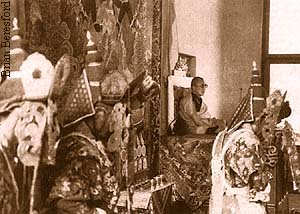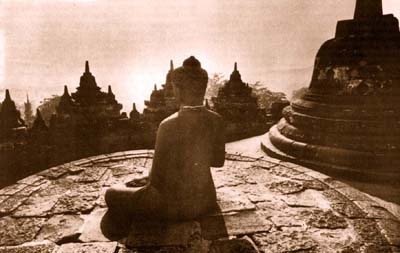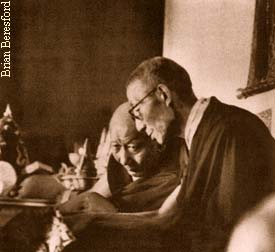Happiness, Karma and Mind
by His Holiness the Fourteenth Dalai Lama
![]() any billions of years elapsed between the origin of this world and the first appearance of living beings upon its surface. Thereafter it took an immense time for living creatures to become mature in thought—in the development a
any billions of years elapsed between the origin of this world and the first appearance of living beings upon its surface. Thereafter it took an immense time for living creatures to become mature in thought—in the development a nd perfection of their intellectual faculties; and even from the time men attained maturity up to the present many thousands of years have passed. Through all these vast periods of time the world has undergone constant changes, for it is in a continual state of flux. Even now, many comparatively recent occurrences which appeared for a little while to remain static are seen to have been undergoing changes from moment to moment. One may wonder what it is that remains immutable when every sort of material and mental phenomenon seems to be invariably subject to the process of change, of mutability. All of them are forever arising, developing and passing away. In the vortex of all these changes it is Truth alone which remains constant and unalterable—in other words, the truth of righteousness (Dharma) and its accompanying beneficial results, and the truth of evil action and its accompanying harmful results. A good cause produces a good result, a bad cause a bad result. Good or bad, beneficial or harmful, every result necessarily has a cause. This principle alone is abiding, immutable and constant. It was so before man entered the world, in the early period of his existence, in the present age, and it will be so in all ages to come.
nd perfection of their intellectual faculties; and even from the time men attained maturity up to the present many thousands of years have passed. Through all these vast periods of time the world has undergone constant changes, for it is in a continual state of flux. Even now, many comparatively recent occurrences which appeared for a little while to remain static are seen to have been undergoing changes from moment to moment. One may wonder what it is that remains immutable when every sort of material and mental phenomenon seems to be invariably subject to the process of change, of mutability. All of them are forever arising, developing and passing away. In the vortex of all these changes it is Truth alone which remains constant and unalterable—in other words, the truth of righteousness (Dharma) and its accompanying beneficial results, and the truth of evil action and its accompanying harmful results. A good cause produces a good result, a bad cause a bad result. Good or bad, beneficial or harmful, every result necessarily has a cause. This principle alone is abiding, immutable and constant. It was so before man entered the world, in the early period of his existence, in the present age, and it will be so in all ages to come.
All of us desire happiness and the avoidance of suffering and of everything else that is unpleasant. Pleasure and pain arise from a cause, as we all know. Whether certain consequences are due to a single cause or to a group of causes is determined by the nature of those consequences. In some cases, even if the cause factors are neither powerful nor numerous, it is still possible for the effect factors to occur. Whatever the quality of the result factors, whether they are good or bad, their magnitude and intensity directly correspond to the quantity and strength of the cause factors. Therefore, for success in avoiding unwished- for pains and in acquiring desired pleasures, which is in itself no small matter, the relinquishment of a great number of collective cause factors is required.
In analyzing the nature and state of happiness, it will he apparent that it has two aspects. One is immediate joy (temporary); the other is future joy (ultimate). Temporary pleasures comprise the comforts and enjoyments which people crave, such as good dwellings, lovely furniture, delicious food, good company, pleasant conversation and so on. In other words, temporary pleasur

es are what man enjoys in this life. The question as to whether the enjoyment of these pleasures and satisfactions derives purely from external factors needs to be examined in the light of clear logic. If external factors were alone responsible for giving rise to such pleasures a person would be happy when these were present and, conversely, unhappy in their absence. However, this is not so. For, even in the absence of external conditions leading to pleasure, a man can still be happy and at peace. This demonstrates that external factors are not alone responsible for stimulating man’s happiness. Were it true that external factors were solely resp
onsible for, or that they wholly conditioned the arising of, pleasure and happiness, a person possessing an abundance of these factors would have illimitable joy, which is by no means always so. It is true that these external factors do make partial contribution to the creation of pleasure in a man’s lifetime. However, to state that the external factors are all that is needed and therefore the exclusive cause of happiness in a man’s span of life is an obtuse and illogical proposition. It is by no means sure that the presence of such external factors will beget joy. On the contrary, factual happenings such as the experiencing of inner beatitude and happiness despite the total absence of such pleasure-causing external factors, and the frequent absence of joy despite their presence, clearly show the cause of happiness to depend upon a different set of conditioning factors.
If one were to be misled by the argument that the above-mentioned conditioning factors constitute the sole cause of happiness to the preclusion of any other conditioning causes, that would imply that (resulting) happiness is inseparably bound to external causal factors, its presence or absence being exclusively determined by them. The fact that this is obviously not so is a sufficient proof that external causal factors are not necessarily or wholly responsible for the effect phenomena of happiness.
Now what is that  other internal set of causes? How are they to be explained? As Buddhists, we all believe in the Law of Karma—the natural law of cause and effect. Whatever external causal conditions someone comes across in subsequent lives result from the accumulation of that individual’s actions in previous lives. When the karmic force of past deeds reaches maturity a person experiences ple
other internal set of causes? How are they to be explained? As Buddhists, we all believe in the Law of Karma—the natural law of cause and effect. Whatever external causal conditions someone comes across in subsequent lives result from the accumulation of that individual’s actions in previous lives. When the karmic force of past deeds reaches maturity a person experiences ple
asurable and unpleasurable mental states. They are but a natural sequence of his own previous actions. The most important thing to understand is that, when suitable (karmic) conditions resulting from the totality of past actions are there, one’s external factors are bound to be favourable. The coming into contact of conditions due to (karmic) action and external causal factors will produce a pleasurable mental state. If the requisite causal conditions for experiencing interior joy are lacking there will be no opportunity for the occurrence of suitable external conditioning factors or, even if these external conditioning factors are present, it will not be possible for the person to experience the joy that would otherwise be his. This shows that inner causal conditions are essential in that these are what principally determine the realization of happiness (and its opposite). Therefore, in order to achieve the desired results it is imperative for us to accumulate both the cause-creating external factors and the cause-creating internal (karmic) conditioning factors at the same time. Continue reading